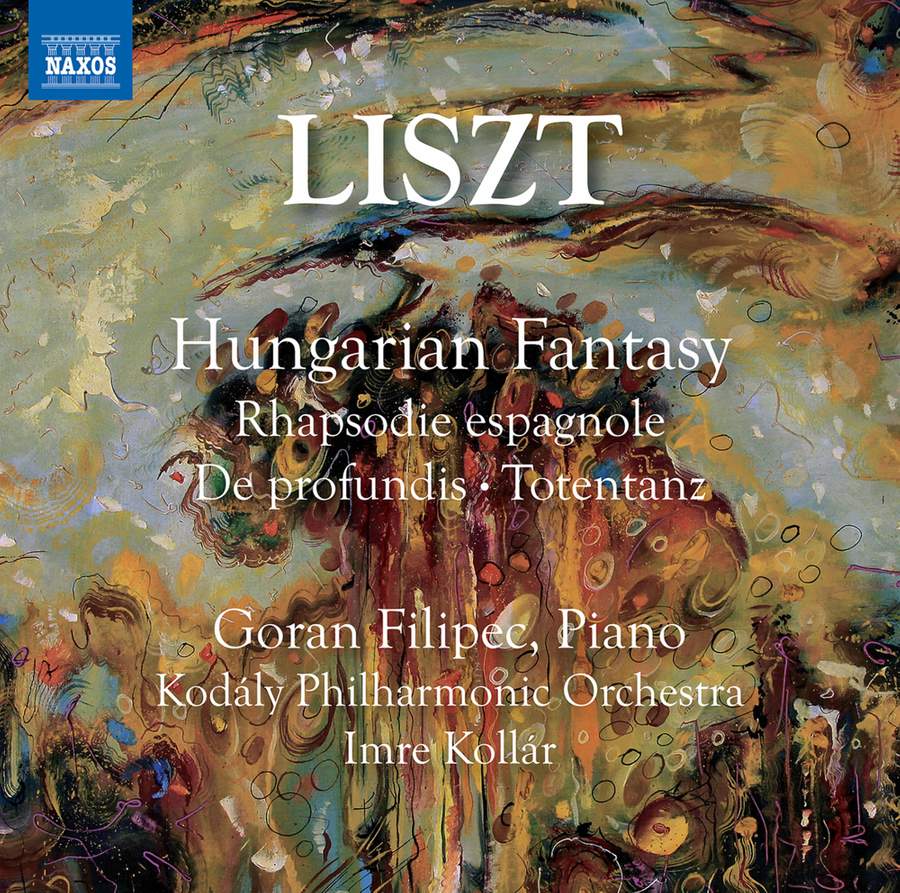LISZT Hungarian Fantasy (Goran Filipec)
View record and artist detailsRecord and Artist Details
Genre:
Orchestral
Label: Naxos
Magazine Review Date: 03/2021
Media Format: CD or Download
Media Runtime: 75
Mastering:
DDD
Catalogue Number: 8 573866

Tracks:
| Composition | Artist Credit |
|---|---|
| Fantasia on Hungarian Folk Themes |
Franz Liszt, Composer
Goran Filipec, Piano Imre Kollár, Conductor Kodály Philharmonic Orchestra |
| Rapsodie espagnole |
Franz Liszt, Composer
Goran Filipec, Piano Imre Kollár, Conductor Kodály Philharmonic Orchestra |
| De profundis |
Franz Liszt, Composer
Goran Filipec, Piano Imre Kollár, Conductor Kodály Philharmonic Orchestra |
| Totentanz |
Franz Liszt, Composer
Goran Filipec, Piano Imre Kollár, Conductor Kodály Philharmonic Orchestra |
Author: Patrick Rucker
The Croation pianist Goran Filipec – whose contributions thus far to the Naxos Liszt series include sets of the Paganini Études, early versions of the second Année de pèlerinage and a collection of dances – has now released an album of works for piano and orchestra with the Kodály Philharmonic under Imre Kollár. In a booklet essay, Filipec considers the musical thought of Liszt and Busoni, along with their penchant for revision, and extrapolates implications for contemporary performance. In lesser hands, this line of reasoning could lead to unlicensed display à la Liberace. Fortunately, Filipec is both a thoughtful musician and a fine player who largely steers clear of excess. He also brings a welcome sense of playfulness and fun to his project. Given the unbroken tradition of Liszt’s orchestral music in Hungary, Kollár and the Debrecen musicians are ideal companions for this repertoire.
The Hungarian Fantasy is relatively straightforward, with Filipec’s additions primarily involving piano embellishments during orchestral tuttis, plus a plenitude of glissandos in the final Vivace assai. Liszt substantially sketched his ‘instrumental psalm’ De profundis in 1834, before abandoning the work and recycling much of its material into the solo piece ‘Pensée des morts’ from Harmonies poétiques et religieuses. During 1989 90 the sketches were completed independently by no fewer than three musicologists, with Jay Rosenblatt’s version used in this performance. We will never know what Liszt would have done had he returned to De profundis in later years. Filipec handles the sometimes ungainly architecture with aplomb, striking just the right degree of lightness and poise in the rather incongruous polonaise section, while lavishing appropriate and proportionate expressivity throughout.
The Totentanz is commonly heard in the version Liszt published in 1865. In 1919, however, Busoni published an earlier 1847 version, which differs in layout and orchestral details from the later revision. It also introduces, with great subtlety and nuance, the ‘De profundis’ chant between the sixth variation and the final Allegro. Given the stark atmosphere and Herculean technical challenges of Totentanz, ‘finesse’ may seem a strange descriptor for this performance. But that is exactly the quality Filipec brings to the work. The opening riffs soar and descend terrifyingly, yet remain beautiful; the famous repeated-note fugue fairly dances; extended chord passages, which often come off as flailing or brutal, here speak with clarity and poise. Combined with Kollár’s cunningly evocative orchestral mise en scène, Filipec’s precise and imaginative realisation of the demanding solo part makes this Totentanz alone well worth hearing.
Discover the world's largest classical music catalogue with Presto Music.

Gramophone Digital Club
- Digital Edition
- Digital Archive
- Reviews Database
- Full website access
From £8.75 / month
Subscribe
Gramophone Full Club
- Print Edition
- Digital Edition
- Digital Archive
- Reviews Database
- Full website access
From £11.00 / month
Subscribe
If you are a library, university or other organisation that would be interested in an institutional subscription to Gramophone please click here for further information.





